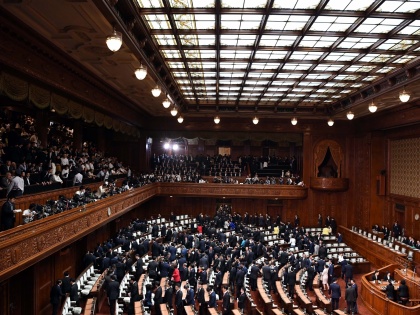Japanese Parliament concludes regular session after enacting contentious defence, immigration laws
By IANS | Published: June 21, 2023 03:45 PM2023-06-21T15:45:03+5:302023-06-21T15:55:11+5:30
Tokyo, June 21 The Japanese Parliament concluded its 150-day regular session on Wednesday during which 58 bills were ...

Japanese Parliament concludes regular session after enacting contentious defence, immigration laws
Tokyo, June 21 The Japanese Parliament concluded its 150-day regular session on Wednesday during which 58 bills were enacted into legislation, including controversial laws related to rising defence spending and immigration.
Prime Minister Fumio Kishida's ruling Liberal Democratic Party-led coalition has enacted legislation spanning a controversial law to boost the pacifist country's defence expenditure, as well as a bill to revise the immigration and refugee law, which was also a point of political contention, reports Xinhua news agency.
During the main session of the year, despite concerns in the wake of the Fukushima nuclear disaster, a bill was also approved by parliament to allow the country's nuclear reactors to be operated beyond the current time limit of 60 years.
As for when Kishida will dissolve the lower chamber and call a snap election, political watchers here believed that the decision would have been announced prior to the end of the regular session, but the Prime Minister quashed such speculation last week.
Political analysts now believe Kishida may be waiting for an uptick in his cabinet's support rate before making the move, which has taken a hit over an array of privacy errors related to the "My Number" national identification card system, amid broader concerns over how key policies will be funded.
On June 16, the lower house voted down a no-confidence motion submitted against Kishida's cabinet by the main opposition Constitutional Democratic Party of Japan (CDPJ).
The CDPJ in the motion against Kishida's cabinet had taken aim at the Prime Minister for being unable to explain how key policies would be funded.
Such policies included controversial, hefty spending plans by Japan to boost its defence capabilities, as well as expenditure to counter the country's rapidly declining birthrate.
Disclaimer: This post has been auto-published from an agency feed without any modifications to the text and has not been reviewed by an editor
Open in app